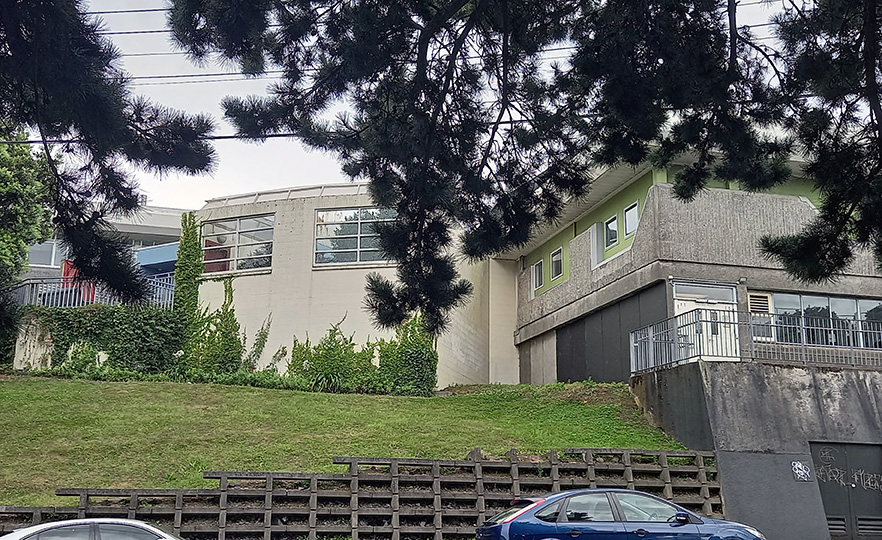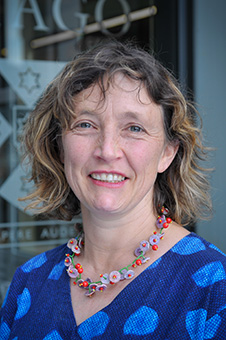
An acute mental health unit on the periphery of a hospital.
Acute mental health care units remain in the shadows, neither fully integrated into general hospitals nor part of the community, researchers from the University of Otago, Wellington, say.
In a paper published in the international journal BMC Health Services Research, the researchers analysed the locations of all 22 acute mental health units in the country, of which 20 were on hospital sites. The team analysed geographic data and mapped mental health units' locations in relation to other hospital facilities and public amenities.

Associate Professor Ruth Cunningham.
Lead researcher Associate Professor Ruth Cunningham says most acute mental health units were set up after large psychiatric institutions were closed with the shift to community mental health care towards the end of the 20th century. These acute units were built on the less desirable parts of existing hospital sites that had remained undeveloped.
“We found that mental health units are usually located on the outskirts of hospitals. Compared with medical wards, they are much further away from the main entrances, the cafes, and other services, such as the radiology and emergency departments. They are also a long way from community services, such as shops, parks and public transport.”
Associate Professor Cunningham says the location of mental health units on the periphery may be understandable for hospitals built prior to 1990, which could not readily incorporate new units within their current architecture.
“However, there is no reason that this should become the norm, which appears to be what has happened, with recent builds either maintaining this peripheral position, or not including mental health units at all, as is the case with both the new Christchurch and Dunedin Hospitals.
“It's the worst of both worlds, because people admitted to mental health units have less access to hospital services, which are essential for providing equitable physical health care, as well as to the wider neighbourhood, a connection which is important for recovery.”

Professor Susanna Every-Palmer.
A co-author of the research, Professor Susanna Every-Palmer from the Department of Psychological Medicine, says while people in acute mental health units require access to medical resources, such as laboratory and radiology facilities and the emergency department, they also need easy access to community resources, such as cafes, libraries, green spaces and public transport.
“Making the units easy to access for visiting family members and reducing stigma are also essential for recovery.”
Professor Every-Palmer says it's important to develop a clear idea of where best to locate facilities as the Government prepares to transform mental health and addiction services and overhaul many of the existing acute mental health inpatient facilities.
“We need to explore whether hospital sites are appropriate or whether inpatient mental health units could be replaced by smaller, community-focused and embedded facilities.
“This will involve working with service users and their whānau and thinking more holistically than just 'bricks and mortar' to work out how spaces and locations where care is provided fit with a model of recovery and connect people to their community.
“We need to consider not just what services are needed, but where they are best located.”
Acute mental health units provide short-term and sometimes involuntary care for about 14,000 people a year in New Zealand, about eight per cent of those cared for by specialist public mental health and addiction services in the community. They offer multidisciplinary care aimed at meeting acute clinical needs so that care can shift back to a community-based setting.
Publication details
Still in the shadows: a national study of acute mental health unit location across New Zealand hospitals
BMC Health Services Research
For more information, contact:
Associate Professor Ruth Cunningham
Department of Public Health
University of Otago, Wellington
Email ruth.cunningham@otago.ac.nz
Professor Susanna Every-Palmer
Department of Psychological Medicine
University of Otago, Wellington
Email susanna.every-palmer@otago.ac.nz
Cheryl Norrie
Communications Adviser
University of Otago, Wellington
Mob +64 21 249 6787
Email cheryl.norrie@otago.ac.nz